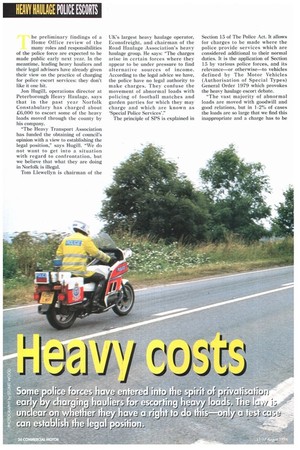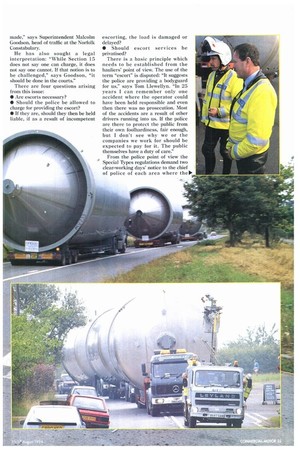he preliminary findings of a Home Office review of the
Page 34

Page 35

If you've noticed an error in this article please click here to report it so we can fix it.
many roles and responsibilities of the police force are expected to be made public early next year. In the meantime, leading heavy hauliers and their legal advisors have already given their view on the practice of charging for police escort services: they don't like it one bit.
Jon Hugill, operations director at Peterborough Heavy Haulage, says that in the past year Norfolk Constabulary has charged about £6,000 to escort some of the heavy loads moved through the county by his company.
"The Heavy Transport Association has funded the obtaining of council's opinion with a view to establishing the legal position," says Hugill. "We do not want to get into a situation with regard to confrontation, but we believe that what they are doing in Norfolk is illegal.
Tom Llewellyn is chairman of the UK's largest heavy haulage operator, Econofreight, and chairman of the Road Haulage Association's heavy haulage group. He says: "The charges arise in certain forces where they appear to be under pressure to find alternative sources of income. According to the legal advice we have, the police have no legal authority to make charges. They confuse the movement of abnormal loads with policing of football matches and garden parties for which they may charge and which are known as 'Special Police Services`."
The principle of SPS is explained in Section 15 of The Police Act. It allows for charges to be made where the police provide services which are considered additional to their normal duties. It is the application of Section 15 by various police forces, and its relevance—or otherwise—to vehicles defined by The Motor Vehicles (Authorisation of Special Types) General Order 1979 which provokes the heavy haulage escort debate.
"The vast majority of abnormal loads are moved with goodwill and good relations, but in 1-2% of cases the loads are so large that we find this inappropriate and a charge has to be made," says Superintendent Malcolm Goodson, head of traffic at the Norfolk Constabulary.
He has also sought a legal interpretation: "While Section 15 does not say one can charge, it does not say one catmot. If that notion is to be challenged," says Goodson, "it should be done in the courts."
There are four questions arising from this issue: • Are escorts necessary?
• Should the police be allowed to charge for providing the escort?
• If they are, should they then be held liable, if as a result of incompetent escorting, the load is damaged or delayed?
• Should escort services be privatised?
There is a basic principle which needs to be established from the hauliers' point of view. The use of the term "escort" is disputed: "It suggests the police are providing a bodyguard for us," says Tom Llewellyn. "In 25 years I can remember only one accident where the operator could have been held responsible and even then there was no prosecution. Most of the accidents are a result of other drivers running into us. If the police are there to protect the public from their own foolhardiness, fair enough, but I don't see why we or the companies we work for should be expected to pay for it. The public themselves have a duty of care."
From the police point of view the Special Types regulations demand two cleareworking days' notice to the chief of police of each area where theills.














































































